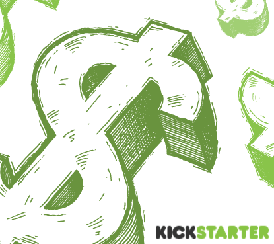What can you Kickstart?
This article originally posted at The Gamer Effect on April 17th, 2013.
 The history of financing independent films is certainly an interesting one. To finance his first feature, El Mariachi, Robert Rodrigez signed up for a series of medical experiments, some of which he still bears the scars from. Kevin Smith financed Clerks by signing up for a slew of credit cards, all maxed out during the production of the film. Presumably, they were later paid off in full.
The history of financing independent films is certainly an interesting one. To finance his first feature, El Mariachi, Robert Rodrigez signed up for a series of medical experiments, some of which he still bears the scars from. Kevin Smith financed Clerks by signing up for a slew of credit cards, all maxed out during the production of the film. Presumably, they were later paid off in full.
So while the buzz surrounding the incredibly successful Kickstarter campaign for a Veronica Mars seems, at least to me, less interesting than some of the tall tales from independent film history, it certainly speaks volumes about the passion many fans have for their favourite characters. Which, naturally, leads many to wonder if their favourite long-lost franchise could be revived through similar campaigns.
Much has already been written about Veronica Mars being a unique case, but I’d still argue that it proves crowdsourcing can be a viable funding method for certain types of projects. Which types? I’m glad you asked! Let’s look at an upcoming example.
Joss Whedon’s Much Ado About Nothing adaptation is due to hit theatres in the coming months (and here it is), and was shot at Whedon’s home with friends and past collaborators. Pitching “a movie I shot over the weekend with my friends” is generally not something studios will go for, even if your last name is Soderbergh and you own several Oscars. Financing such projects is difficult even among top-level talent, but giving fans of these filmmakers a chance to be a backer is enticing. There are limits to this, however. It’s unlikely you’ll see something with a budget past seven figures (other than Veronica Mars) crowdsourced unless a major name or property is involved, but not all projects need that much capital to get off the ground. Such as documentaries.
With only a few exceptions, documentaries usually sell themselves on their topic. Similar to fans backing a Director they’re passionate about, the topic of a documentary alone can bring in a crowd to, well, source. Passionate about, say, the surprisingly high overlap between veganism and endurance running? Maybe on the portrayal of women in comic books? Chances are, you’re not alone, and there’s someone willing to make a documentary about it. Documentaries are also, with rare exceptions, much less budget-intensive. Rights for archive footage and speaking fees for talking heads can go a long way in documentary filmmaking, and special effects are a rarity. Even an incredibly polished and slick documentary like Bart Layton’s The Imposter could be produced for less than the average feature.
Cross-platform projects are also in the running. Say you’d love to hear a song written and performed by your favourite author. Odds are, their publisher couldn’t do much about it, and record companies aren’t really that interested in such projects. But if it only costs $1000 for, say, Neil Gaiman, to book some studio time to get it done, crowdsourcing seems like the most viable option. Crossing platforms used to be a sign of celebrity excess. Now, it’s just smart business. And it certainly seems to be working for YouTube personality Hannah Hart, known for her My Drunk Kitchen series, which successfully crowdsourced a tour across the United States and Canada. But for total non-celebrities? I decided to ask around.
Local playwright, actor and friend of the author Ryan M. Sero was willing to discuss his experience with his attempt to get a play he wrote financed with a crowdsourcing site. “For me, it didn’t really work,” he explained. “I raised a little money, but not a lot. I covered my poster budget.” But he didn’t dismiss crowdsourcing entirely. “I think in order for those campaigns to succeed, you need a strong social media presence. I would consider using it in the future, but I would have to become much more savvy with things like twitter, instagram, reddit, facebook, etc.”
So for creators deeply in touch with their audience, there is hope. While a lot of these examples have to do with name recognition, they perhaps have more to do with connection. Social media, at it’s best, is just that. Social. Crowdsourcing requires a crowd, and because of that, the creator with the best crowd often wins.

An interesting set of ideas but you never answered the title question! How will I know what I can Kickstart?!
Thanks for your feedback, Brian. The article is, for the most part, meant to be a guide to what sort of films and filmmakers can we daydream about crowdsourcing in the future. I’m by no means an expert on the ins and outs of crowdsourcing your own projects, which is why I consulted someone who has.
I’m almost ready to start a Kickstarter… I’m having enough trouble with the rewards right now, I can’t imagine doing it on a larger scale, such as with a movie.